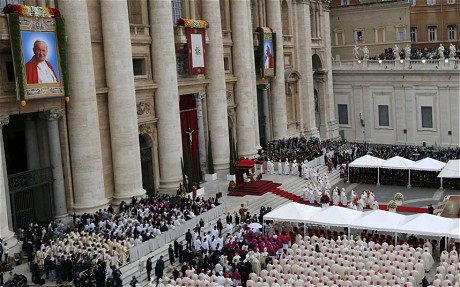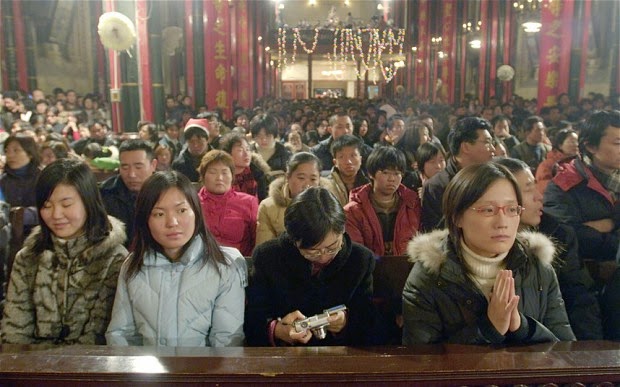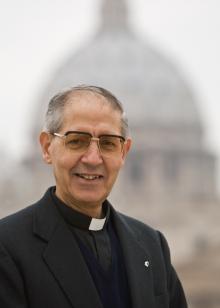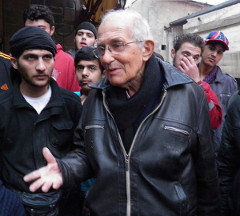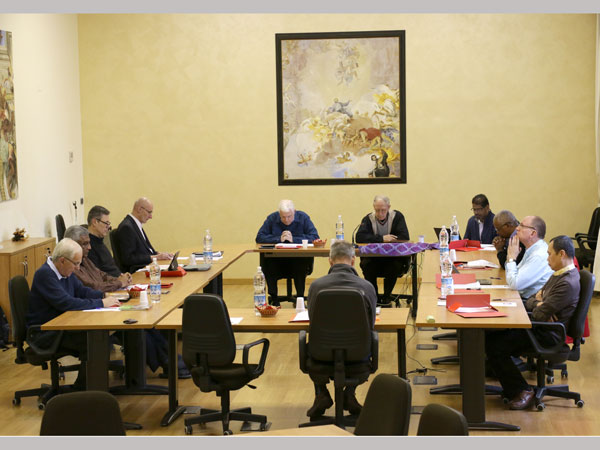Provinces collaborate to offer Sacred Space in China

The Chinese and Irish Provinces have collaborated to make Sacred Space, the world’s leading interactive guided prayer site available in China for the first time.
“Sacred Space is much loved around the world,” said Fr Michael Kelly SJ, Executive Director of UCAN, which facilitated the collaboration between the two provinces. “Tens of thousands access the site in 20 languages and it seemed to me a real waste to have this great aid to deepening our engagement with God not available to the growing number of Christians in the People’s Republic of China.”
After a year of work by the team at Sacred Space, which is produced by Irish Jesuits, and the Chinese Province, Sacred Space in now available in Simplified Characters through the main Sacred Space website as well as directly at a new site: www.shenshengkongjian.org.
“Two problems prevented access: the content was not in the script used in China and China’s Great Fire Wall meant that even the content in Traditional Characters was blocked because it was available only on a site with a URL in Taiwan. The Chinese cyber police blocked it.
Sacred Space in Chinese“These were easily solved – by having the Traditional Characters changed to Simplified Characters through widely available technology; and by having the content hosted on a URL that won’t upset the Chinese authorities.
“What we now have is the prayer content available in a script used in China and available on a URL that isn’t blocked,” Fr Kelly added.
Sacred Space attracts more than half a million visitors a month, leading them through the Ignatian Examination of Conscience (Examen) with almost 20,000 visitors following the prayerful process on weekdays.
The new Simplified Character site draws on the work done by Irish writers and Chinese translators, most of whom are lay people.
A visitor to the site is led on a journey through five pages. First the visitor is invited to slow down and experience the calm of contemplative stillness. Next the visitor is invited to examine the people and events of a day and see how they have brought him or her to peace and composure or confusion and disturbance.
These “moods” are then viewed in the light of a passage from the Gospel drawn from each day’s Mass. The session ends with a prayerful expression of gratitude for God’s healing.
Developed in 1999 by Irish Jesuit Fr Peter Scally. Sacred Space grew quickly in reach and the number of languages and scripts it offers. Today, the prayer guide is available in 20 languages, including the Simplified and Traditional Chinese scripts and Korean.
Pope Francis makes saints of Popes John XXIII and John Paul II
Pope Francis has proclaimed two of his predecessors, Popes John XXIII and John Paul II, as saints of the Roman Catholic Church at a ceremony in St Peter’s Square.
The open-air event was watched by up to a million people at the Vatican and on giant screens positioned around Rome, while millions more watched on television around the world.
At the beginning of the canonisation ceremony, Pope Francis greeted and embraced Emeritus Pope Benedict XVI, his predecessor, who has looked increasingly tired and frail since his resignation last year.
It is the first time in the history of the Catholic Church that two living Popes have presided over the canonisation of two of their predecessors.
“We declare and define as saints the blessed John XXIII and John Paul II,” Francis said in a Latin prayer from an altar in front of St Peter’s Basilica.

He was flanked by foreign dignitaries, various royals and hundreds of cardinals and bishops.
In what has been dubbed “the day of the four Popes”, the Vatican confirmed that Pope Emeritus Benedict XVI – who last year became the first pontiff since the Middle Ages to resign – was to be in attendance at today’s event.
Thousands of pilgrims slept out in St Peter’s Square and surrounding streets overnight in order to reserve a prime spot for the ceremony, which was expected to last for about two hours.
Catholics from all over the world have gathered in Rome for the unprecedented double canonisation, with a huge contingent from Poland, the homeland of the John Paul II.
Polish women in traditional national dress, boy scouts and girl guides and priests and nuns waved the red and white flag of Poland as they walked towards St Peter’s Basilica.

From an altar in front of the Basilica, Pope Francis will be flanked by scarlet-clad cardinals on one side and foreign dignitaries, including heads of state and royalty, on the other, when he leads the ceremony to canonise his two predecessors.
More than 10,000 members of the security forces have been deployed for the event, the biggest Vatican occasion since the funeral of John Paul II drew millions of people to Rome in 2005.
There has been a festival atmosphere in the city this weekend, with groups of priests banging drums and singing songs, special services held in more than a dozen churches and flags from across the world displayed by the faithful.
A group of priests from Chile carried two large cardboard cut-outs of Popes John Paul II and John XXIII, enabling people to take “selfies” of themselves with the soon-to-be made saints.
Pope Benedict, who lives in a former convent in the grounds of the Vatican, will be among 150 cardinals and 700 bishops who will “concelebrate” with Pope Francis and take part in the canonisation ceremony.
“We will all be happy to have his presence” at the ceremony, Father Federico Lombardi, the Vatican spokesman, said.

It is unprecedented for two living Popes to preside over the canonisation of two of their predecessors.
During the ceremony, the head of the Vatican’s saint-making office, Cardinal Angelo Amato, was expected to ask Pope Francis three separate times to include John XXIII and John Paul II among the saints of the Roman Catholic Church.
The three repeated requests for canonisation “signify the importance of this celebration,” the Reverend Federico Lombardi said.
Pope Francis was then expected to say: “For the honour of the Blessed Trinity, the exaltation of the Catholic faith and the increase of the Christian life, by the authority of our Lord Jesus Christ, and of the holy Apostles Peter and Paul, and our own, after due deliberation and frequent prayer for divine assistance, and having sought the counsel of many of our brother bishops, we declare and define Blessed John XXIII and John Paul II be saints and we enrol them among the saints, decreeing that they are to be venerated as such by the whole church.”
Relics of the two former Popes were then due to be held up – for John Paul II, a vial of his blood, and for John XXIII, a piece of skin taken from his body after it was exhumed for his beatification in 2000.
Among the dignitaries on the guest list were 24 heads of state and 10 heads of government, including the kings and queens of Spain and Belgium, and Lech Walesa, the founder of the Solidarity labour movement in Poland, which enjoyed staunch support from Pope John Paul II and helped bring down Communism.
China on course to become ‘world’s most Christian nation’ within 15 years

By Tom Phillips, Liushi, Zhejiang province, The Telegraph, UK
It is said to be China’s biggest church and on Easter Sunday thousands of worshippers will flock to this Asian mega-temple to pledge their allegiance – not to the Communist Party, but to the Cross.
The 5,000-capacity Liushi church, which boasts more than twice as many seats as Westminster Abbey and a 206ft crucifix that can be seen for miles around, opened last year with one theologian declaring it a “miracle that such a small town was able to build such a grand church”.
The £8 million building is also one of the most visible symbols of Communist China’s breakneck conversion as it evolves into one of the largest Christian congregations on earth.
“It is a wonderful thing to be a follower of Jesus Christ. It gives us great confidence,” beamed Jin Hongxin, a 40-year-old visitor who was admiring the golden cross above Liushi’s altar in the lead up to Holy Week.
“If everyone in China believed in Jesus then we would have no more need for police stations. There would be no more bad people and therefore no more crime,” she added.
Officially, the People’s Republic of China is an atheist country but that is changing fast as many of its 1.3 billion citizens seek meaning and spiritual comfort that neither communism nor capitalism seem to have supplied.
Christian congregations in particular have skyrocketed since churches began reopening when Chairman Mao’s death in 1976 signalled the end of the Cultural Revolution.
Less than four decades later, some believe China is now poised to become not just the world’s number one economy but also its most numerous Christian nation.
“By my calculations China is destined to become the largest Christian country in the world very soon,” said Fenggang Yang, a professor of sociology at Purdue University and author of Religion in China: Survival and Revival under Communist Rule.
“It is going to be less than a generation. Not many people are prepared for this dramatic change.”
China’s Protestant community, which had just one million members in 1949, has already overtaken those of countries more commonly associated with an evangelical boom. In 2010 there were more than 58 million Protestants in China compared to 40 million in Brazil and 36 million in South Africa, according to the Pew Research Centre’s Forum on Religion and Public Life.
Prof Yang, a leading expert on religion in China, believes that number will swell to around 160 million by 2025. That would likely put China ahead even of the United States, which had around 159 million Protestants in 2010 but whose congregations are in decline.
By 2030, China’s total Christian population, including Catholics, would exceed 247 million, placing it above Mexico, Brazil and the United States as the largest Christian congregation in the world, he predicted.
“Mao thought he could eliminate religion. He thought he had accomplished this,” Prof Yang said. “It’s ironic – they didn’t. They actually failed completely.”
Like many Chinese churches, the church in the town of Liushi, 200 miles south of Shanghai in Zhejiang province, has had a turbulent history.
It was founded in 1886 after William Edward Soothill, a Yorkshire-born missionary and future Oxford University professor, began evangelising local communities.
But by the late 1950s, as the region was engulfed by Mao’s violent anti-Christian campaigns, it was forced to close.
Liushi remained shut throughout the decade of the Cultural Revolution that began in 1966, as places of worship were destroyed across the country.
Since it reopened in 1978 its congregation has gone from strength to strength as part of China’s officially sanctioned Christian church – along with thousands of others that have accepted Communist Party oversight in return for being allowed to worship.
Today it has 2,600 regular churchgoers and holds up to 70 baptisms each year, according to Shi Xiaoli, its 27-year-old preacher. The parish’s revival reached a crescendo last year with the opening of its new 1,500ft mega-church, reputedly the biggest in mainland China.
“Our old church was small and hard to find,” said Ms Shi. “There wasn’t room in the old building for all the followers, especially at Christmas and at Easter. The new one is big and eye-catching.”
The Liushi church is not alone. From Yunnan province in China’s balmy southwest to Liaoning in its industrial northeast, congregations are booming and more Chinese are thought to attend Sunday services each week than do Christians across the whole of Europe.
A recent study found that online searches for the words “Christian Congregation” and “Jesus” far outnumbered those for “The Communist Party” and “Xi Jinping”, China’s president.
Among China’s Protestants are also many millions who worship at illegal underground “house churches”, which hold unsupervised services – often in people’s homes – in an attempt to evade the prying eyes of the Communist Party.
Such churches are mostly behind China’s embryonic missionary movement – a reversal of roles after the country was for centuries the target of foreign missionaries. Now it is starting to send its own missionaries abroad, notably into North Korea, in search of souls.
“We want to help and it is easier for us than for British, South Korean or American missionaries,” said one underground church leader in north China who asked not to be named.
The new spread of Christianity has the Communist Party scratching its head.
“The child suddenly grew up and the parents don’t know how to deal with the adult,” the preacher, who is from China’s illegal house-church movement, said.
Some officials argue that religious groups can provide social services the government cannot, while simultaneously helping reverse a growing moral crisis in a land where cash, not Communism, has now become king.
They appear to agree with David Cameron, the British prime minister, who said last week that Christianity could help boost Britain’s “spiritual, physical and moral” state.
Ms Shi, Liushi’s preacher, who is careful to describe her church as “patriotic”, said: “We have two motivations: one is our gospel mission and the other is serving society. Christianity can also play a role in maintaining peace and stability in society. Without God, people can do as they please.”
Yet others within China’s leadership worry about how the religious landscape might shape its political future, and its possible impact on the Communist Party’s grip on power, despite the clause in the country’s 1982 constitution that guarantees citizens the right to engage in “normal religious activities”.
As a result, a close watch is still kept on churchgoers, and preachers are routinely monitored to ensure their sermons do not diverge from what the Party considers acceptable.
In Liushi church a closed circuit television camera hangs from the ceiling, directly in front of the lectern.
“They want the pastor to preach in a Communist way. They want to train people to practice in a Communist way,” said the house-church preacher, who said state churches often shunned potentially subversive sections of the Bible. The Old Testament book in which the exiled Daniel refuses to obey orders to worship the king rather than his own god is seen as “very dangerous”, the preacher added.
Such fears may not be entirely unwarranted. Christians’ growing power was on show earlier this month when thousands flocked to defend a church in Wenzhou, a city known as the “Jerusalem of the East”, after government threats to demolish it. Faced with the congregation’s very public show of resistance, officials appear to have backed away from their plans, negotiating a compromise with church leaders.
“They do not trust the church, but they have to tolerate or accept it because the growth is there,” said the church leader. “The number of Christians is growing – they cannot fight it. They do not want the 70 million Christians to be their enemy.”
The underground leader church leader said many government officials viewed religion as “a sickness” that needed curing, and Prof Yang agreed there was a potential threat.
The Communist Party was “still not sure if Christianity would become an opposition political force” and feared it could be used by “Western forces to overthrow the Communist political system”, he said.
Churches were likely to face an increasingly “intense” struggle over coming decade as the Communist Party sought to stifle Christianity’s rise, he predicted.
“There are people in the government who are trying to control the church. I think they are making the last attempt to do that.”
Commemorating the Restoration of the Society 200 years ago

Jesuits across Asia Pacific have planned various activities to commemorate the bicentennial of the Restoration of the Society of Jesus. In 1814, Pope Pius VII ordered the restoration of the Society, which had been suppressed in 1773 by Pope Clement XIV.
Globally the year-long celebration of the bicentennial began on January 3, at the mass for the feast of the Most Holy Name of Jesus, which Pope Francis celebrated with fellow Jesuits at the Church of the Gesù in Rome.
In a letter dated November 14, 2013, Father Adolfo Nicolás, Superior General of the Society of Jesus, wrote, “I pray that our grateful commemoration of this 200th anniversary of the Society’s reestablishment might be blessed with a deeper appropriation of our way of life and a more creative, generous and joyful commitment to give our lives in service for the greater glory of God.”
Encouraged by the Father General to commemorate the anniversary “with humble and sincere gratitude to the Lord, with a desire to learn from our history, and as an occasion for spiritual and apostolic renewal”, many of the planned activities cater to both Jesuit communities and their lay partners.
Symposia, seminars and assemblies are planned, as well as reflections and retreats and community celebrations.
In March, the Matteo Ricci Institute in Macau will hold a seminar focused on understanding the Suppression in Europe and reflecting on the Suppression from the perspective of the Chinese Province. The institute will also host a 3-day international symposium in October that will focus on the history of the Restoration in east-central Europe, Russia, China and the United States. There will also be a three-day symposium in Hong Kong.
The Korean Jesuits are also planning a symposium, to be held in the second half of the year, and all communities will set aside time for reflection and renewal.
The Malaysia-Singapore Region will have a seminar with lay collaborators in May, with Jesuit historian Fr Tony de Castro SJ as the main presenter, and a retreat later in the year.
The Japan Province will mark the anniversary with province assemblies – on July 31 for the Jesuits in the western area, and on December 26 for those residing in Tokyo.
The Australian Province will be publishing various writings on the Suppression and Restoration, while the Thai Region is translating some Jesuit books into Thai.
In Indonesia, papers from a seminar held in December 2013 have been published in a book for lay partners. A reflection gathering is planned in Yogyakarta in March, and celebrations in July and October with lay partners.
For the Philippine Province, the bicentennial was an opportune time to develop the Province roadmap. Several activities are planned throughout the year including conferences and talks on the Suppression and Restoration of the Society, art exhibits, plays, a roadshow of Jesuit music and a major concert. A video, 200 Years after Restoration, was produced and released in January.
The Vietnam Province also celebrates in 2014 the 400th anniversary of the arrival of Jesuits in the country. For the bicentennial, the Vietnamese Jesuits have planned Province retreats, a study on Jesuit history, a recollection for collaborators, and a talk in the scholasticate.
Myanmar and Timor Leste will mark the anniversary with retreats.
Wisdom Story – 90

Here is an anecdote from Alan Watts’, “The ‘Mind-less’ Scholar”
I remember D. T. Suzuki’s address to the final meeting of the 1936 World Congress of Faiths at the old Queen’s Hall in London. The theme was “The Supreme Spiritual Ideal,” and after several speakers had delivered themselves of volumes of hot air, Suzuki’s turn came to take the platform. “When I was first asked,” he said, “to talk about the Supreme Spiritual Ideal, I did not exactly know what to answer.
Firstly, I am just a simple-minded countryman from a far away corner of the world suddenly thrust into the midst of this hustling city of London, and I am bewildered and my mind refuses to work in the same way that it does when I am in my own land.
Secondly, how can a humble person like myself talk about such a grand thing as the Supreme Spiritual Ideal?… Really I do not know what Spiritual is, what Ideal is, and what Supreme Spiritual Ideal is.”
Whereupon he devoted the rest of his speech to a description of his house and garden in Japan, contrasting it with the life of a great city. This from the translator of the Lankavatara Sutra! And the audience gave him a standing ovation.
Fr General on mission in Asia

Fr General Adolfo Nicolás delivered the opening address at a recent Pontifical Gregorian University event held to celebrate the 100th anniversary of the Jesuit-run Sophia University in Tokyo. A former student of Sophia in the 1960s and a former provincial of the Japanese Province, Fr Nicolás spoke on Sophia’s contribution to the mission of the Catholic Church in Asia.
Fr Nicolás urged Japanese Catholics to promote religious sensitivity in their country and not to lose hope because they represent a small minority of the country’s population.
Comparing how many people have lost attentiveness to music because of the many other distractions of the modern technological age, Fr Nicolás said, “Just as this musical sense is being eroded and weakened by the noise, the pace, the self-images of the modern and postmodern world, so is religious sensitivity.”
“I suggest that mission today in Japan and Asia must first of all work toward people helping discover or rediscover this musical sense, this religious sensibility,” he said. “This awareness and appreciation of dimensions of reality that are deeper than instrumental reason or materialist conceptions of life allow us.”
Fr Nicolás also urged the staff and faculty at Sophia to not make the institution a place that is “primarily market driven.”
“Competition, the search for higher rankings for the sake of even more economic gain, has become the driving force for some institutions,” he said. “It would be a tragedy if our universities simply replicated the rationality and self-understandings of our secular, materialist world. Our reason for being in education is completely different.”

Sophia 100th Anniversary”We are not in education for proselytism, but for transformation. We want to form a new kind of humanity that is musical, that retains this sensitivity to beauty, to goodness, to the suffering of others, to compassion.”
“We offer a Christian education because we are convinced that Christ offers horizons beyond the limited interests of economy or material production, that Christ offers a vision of a fuller humanity that takes the person outside himself or herself in care and concern for others,” he said.
Fr Nicolás was one of about a dozen speakers at event, held on March 14 and 15, which focused on the wider role of Jesuits in Japan and the specific contributions of Sophia since its founding in 1913.
Among attendees were faculty and staff from both universities, Jesuits from various parts of the world, and Japan’s ambassador to Italy, Masaharu Kono.
The other speakers included Fr Shinzô Kawamura SJ, a professor of humanities at Sophia University, who spoke of Francis Xavier, comparing contemporary accounts of Xavier’s missionary work with modern understandings of his role, calling him a “classic exemplar” of a “balance between doctrine and practice” in missionary work.
Another speaker was Yoshiaki Ishizawa, Sophia’s president from 2005 to 2011, who spoke of efforts initiated by the university to send missions and personnel to help preserve and restore the 12th-Century Angkor monuments in Cambodia, which are in significant decay.
Along with others, Ishizawa founded in 1996 a branch of Sophia University in Siem Reap, called the Asia Centre of Research and Human Development, which has focused on preserving the country’s heritage sites. [National Catholic Reporter]
Dutch Jesuit, Who Served 50 Years in Syria, Killed in Homs

Dutch Jesuit Father Frans van der Lugt, 75, who refused to leave war-torn Syria, instead staying in Homs to help the poor and homeless, was beaten by armed men and killed with two bullets to the head today, according to an email sent by the Jesuits’ Middle East province to the Jesuit headquarters in Rome.
Fr. Van der Lugt, who had worked in Syria since 1966, declined suggestions to leave because he wanted to help Syria’s suffering civilians – “Christians and Muslims – anyone in need,” said Father Giuseppe Bellucci, head of the Jesuits’ press office.
Fr. Van der Lugt became known around the world after appealing for aid for the people of the besieged city of Homs in a video posted on YouTube in late January.
The United Nations supervised an evacuation of about 1,400 people from Homs in early February; arriving in Jordan, the refugees confirmed Fr. Van der Lugt’s accounts of people, especially young children, starving to death.
Speaking to Catholic News Service by telephone Feb. 6, the Jesuit priest had said: “There has been no food. People are hungry and waiting for help. No injured people have been allowed to leave. Families have been hoping to get out of the siege and out of the fighting between the two sides.
“The wounded have not received proper treatment, so healing has been difficult. Newborns die very quickly because of a lack of milk,” he said. “There have been cases of death due to hunger and starvation.”
Fr. Van der Lugt was born April 10, 1938, in the Netherlands and entered the Society of Jesus in 1959. During the almost 50 years he served in Syria, he worked in education and in a project for handicapped people. In the 1980s, he opened Al Ard (“the land”), a center of spirituality just outside of Homs. The center housed about 40 children with mental disabilities from nearby villages. He was also a psychotherapist and very involved in interreligious dialogue.
In a statement, the Holy See’s press spokesman, Jesuit Father Federico Lombardi, said Fr. Van der Lugt “died as a man of peace, who with great courage in an extremely dangerous and difficult situation, wanted to remain faithful to the Syrian people to whom he had dedicated so many years of his life and spiritual service. Where people die, their faithful shepherds also die with them. In this time of great sorrow, we express our participation in prayer, but also great pride and gratitude for having had a brother so close to the most suffering in the testimony of the love of Jesus to the end.” [Sources: Catholic News Service, Vatican Radio]
Commissio Interprovinciale Permanens (CIP) Starts their Meeting

The Commissio Interprovinciale Permanens (CIP) started their 3 days meeting with Fr. General in Rome. Issues being discussed include: collaboration among Roman academic institutions, young Jesuits studying in Rome, and evaluation of the CIP and of the DIR since GC 35. Attending the meeting as an observer will be Fr. Arturo Sosa (VEN), recently named to become DIR Delegate next Fall.
– Prayer of St. Francis – make me an instrument of your peace
Wisdom Story – 85

“The Master made it his task to destroy systematically every doctrine, every belief, every concept of the divine, for these things, which were originally intended as pointers, were now being taken as descriptions.
He loved to quote the Eastern saying “When the sage points to the moon, all that the idiot sees is the finger.”

